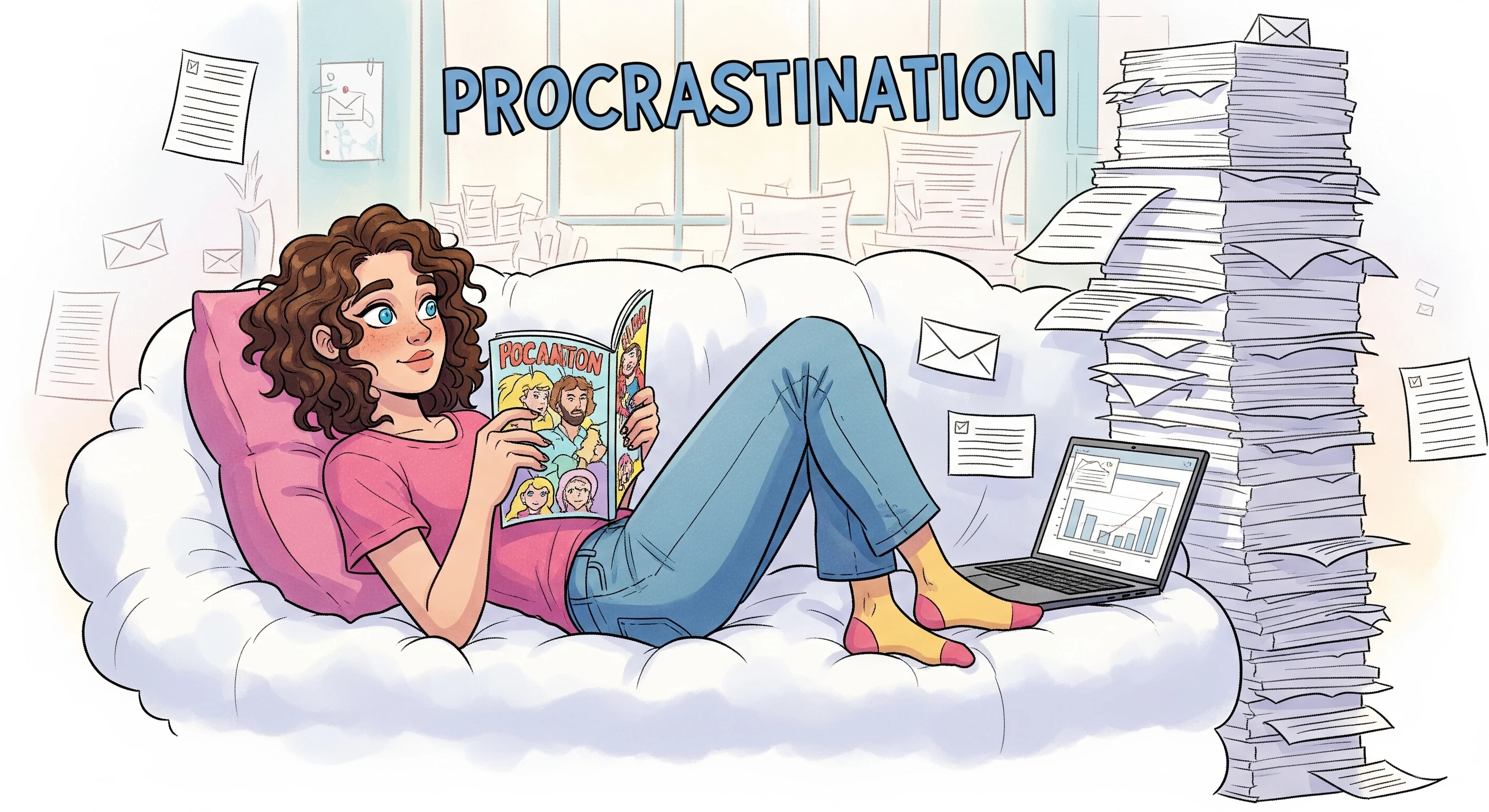Why We Procrastinate (And How to Stop!)
Procrastination is a common struggle for students worldwide. It's that nagging feeling of knowing what you *should* be doing, but somehow finding yourself doing anything else. Understanding the root causes is the first step to overcoming it.
Often, procrastination stems from a fear of failure, perfectionism, lack of clarity, or simply feeling overwhelmed by the task at hand. The good news? These are all surmountable challenges!

1. Break Down Big Tasks
One of the biggest reasons we procrastinate is that a task feels too large and daunting. Instead of thinking about "writing an essay," break it down into smaller, manageable steps:
- Brainstorming ideas (15 minutes)
- Creating an outline (30 minutes)
- Writing the introduction (20 minutes)
- Research for body paragraph 1 (45 minutes)
- And so on...
This makes the task less intimidating and gives you a clear starting point. Each completed mini-task provides a sense of accomplishment, building momentum.
2. The Pomodoro Technique
This popular time management method involves breaking work into focused intervals, traditionally 25 minutes in length, separated by short breaks. Here's how it works:
- Choose a task.
- Set a timer for 25 minutes.
- Work on the task with full focus until the timer rings.
- Take a 5-minute short break.
- After four Pomodoros, take a longer break (15-30 minutes).
The Pomodoro Technique helps train your brain to focus, reduces mental fatigue, and creates a sense of urgency, making it harder to procrastinate.
3. Eliminate Distractions
In our digital age, distractions are everywhere. To study effectively, you need to create an environment conducive to concentration:
- Turn off phone notifications: Put your phone on silent or in another room.
- Close unnecessary tabs: Only have the tabs open that are essential for your study.
- Find a quiet space: Libraries, dedicated study rooms, or a quiet corner at home can work wonders.
- Inform others: Let family or roommates know you need uninterrupted study time.
Even small distractions can break your flow and make it harder to get back on track.
4. Set SMART Goals
When your goals are vague, it's easy to put them off. Make your study goals Specific, Measurable, Achievable, Relevant, and Time-bound. For example, instead of "study for biology," aim for "complete chapters 1-3 of biology textbook by end of day Friday."
5. Reward Yourself
Positive reinforcement is powerful. After completing a significant study session or achieving a small goal, reward yourself! This could be a short break, a favorite snack, watching an episode of a show, or listening to music. Make sure the reward isn't another form of procrastination, but something you genuinely enjoy.
6. Prioritize and Plan
Use a planner or a digital calendar to map out your study sessions. Identify your most important and urgent tasks and tackle those first. The "Eisenhower Matrix" (Urgent/Important) can be a helpful tool for prioritizing.
7. The 2-Minute Rule
If a task takes less than two minutes to complete, do it immediately. This applies to small things like replying to an email, putting away your books, or making a quick note. This prevents small tasks from piling up and contributing to a feeling of overwhelm.
8. Understand Your Peak Productivity Times
Are you a morning person or a night owl? Schedule your most demanding study tasks during the times of day when you feel most alert and focused. Save lighter tasks for when your energy wanes.
9. Practice Self-Compassion
Don't beat yourself up if you slip up and procrastinate. It happens! Acknowledge it, learn from it, and get back on track. Self-criticism can often lead to more procrastination. Be kind to yourself.
10. Seek Support When Needed
If you're consistently struggling, don't hesitate to reach out. Talk to a trusted friend, family member, academic advisor, or even a therapist. Sometimes, an external perspective or professional guidance can make a significant difference.

Effective Study Strategies to Maximize Learning
Beyond overcoming procrastination, how you study significantly impacts what you retain. Here are some proven techniques:
1. Active Recall
Instead of passively re-reading notes, actively test yourself. After reading a section, close your book and try to recall everything you remember. Use flashcards, practice questions, or simply explain the concept aloud to yourself.
2. Spaced Repetition
Don't cram! Review material at increasing intervals over time. For example, review new information after a day, then three days, then a week, then a month. This helps solidify information in your long-term memory.
3. Feynman Technique
This powerful learning method involves explaining a concept as if you were teaching it to someone else (or even a rubber duck!). If you can't explain it simply, you don't fully understand it. Identify your knowledge gaps and go back to review those areas.
4. Interleaving
Instead of studying one subject for a long period, switch between different subjects or topics during a study session. This helps your brain make connections and improves long-term retention.
5. Mind Mapping
Visually organize information by creating mind maps. Start with a central topic and branch out with related ideas, keywords, and images. This can help with understanding complex topics and recalling information.
6. Regular Breaks
Your brain needs time to process information. Short, regular breaks (like those in the Pomodoro Technique) prevent burnout and improve focus when you return to studying.
7. Stay Hydrated and Eat Well
Physical well-being directly impacts cognitive function. Drink plenty of water and fuel your body with nutritious food to maintain energy levels and focus.
8. Get Enough Sleep
Sleep is crucial for memory consolidation. Aim for 7-9 hours of quality sleep each night, especially after learning new material. Studying without adequate sleep is like trying to fill a leaky bucket.
Conclusion: Your Journey to Effective Learning
Overcoming procrastination and studying effectively are skills that improve with practice. By implementing these strategies consistently, you'll not only boost your academic performance but also reduce stress and build lasting habits for success beyond your studies.
Start small, celebrate your progress, and remember that every step forward is a victory. Happy studying!